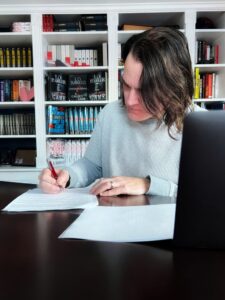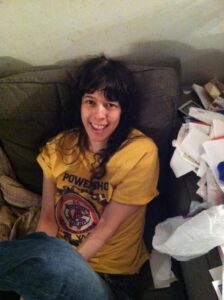Dr. Grandin taught me that I did not need to blame, shame, or hate myself just because I was different.
By Wendi E. Powers
As an over-forty college graduate, I attributed my difficulties to complex childhood trauma. Although I was in therapy for PTSD and Dissociative Identity Disorder, I become discouraged. No matter how hard I struggled to “normalize” my emotional regulation, something always felt “off” inside. Jumping at sudden sounds was a common symptom of PTSD. However, I could not stand to be around crowds or any noises that were unexpected or conflicting. After my diagnosis of Autism in 2013, I suddenly had a word to anchor my reality.
Shortly after receiving my diagnosis, I went to the beach for a much-deserved vacation. Shells have always fascinated me with their intricate shapes and patterns. Some of my favorites are those broken hundreds of years ago and worn smooth of jagged edges by the push and pull of the ocean’s tides. I could relate to broken shells far better than I could relate to other humans. That was until (while sitting in the hotel room sorting through my newly acquired treasures) a movie began playing on the freebie channel: Temple Grandin. Pushing aside shards of rose, coral, and ivory, I grabbed my pillow. Two hours later, my feet sat us down on a new planet. SOMEONE ELSE understood what it was like to be me! I was no longer alone.
After returning home, I watched every video I could find from this remarkable lady. It was very clear to me that Dr. Temple Grandin did not allow herself, or anyone else, to use autism as an excuse. It was a parent’s job to teach the autistic child the same manners other children were expected to follow.
Likewise, autistic adults are expected to emerge from their basement tombs and becoming productive members of society. I became thankful for my parents who did just that. Sure, I liked to talk a million-words-a-second, but mom taught me that my ears needed to hear twice the number of words my mouth could speak. After all, God had given us all two ears with every one mouth. It was simple math. It was logical. So, I worked very hard attempting to maintain that balance. Of course, if the other person was not getting their part of the conversation out fast enough, I still wanted to help by loaning them some of my extra words. My mom knew I was a unique child; but, she also knew that every child was unique. Just because I finally had a label to add to my collection did not mean I could use it as an excuse to give up on life. In fact, having that label was societies way of honoring my truth. It was their way of apologizing for the school bullies who called me “Weird Wendi.” I had finally found my tribe.
Dr. Grandin taught me that I did not need to blame, shame, or hate myself just because I was different. For one thing, I did not know that many people. PTSD caused me to fear anyone physically approaching my space; and, autism made even simple conversation a chore I simply wanted to avoid.
For example, my former employer would hold events for the customers to socialize with company employees–neurotypicals just loved playing host! I, on the other hand, would figure out ways to limit the time I was forced to spend interacting with those customers. I was just fine interacting with them over the telephone because every call had a specific purpose. Things needed fixing, and I was great at fixing things! Unfortunately, my skill at delighting the customer backfired. Eager customers would hunt me down insisting on shaking my hand and snapping a picture with me. I quickly learned that laxatives were my friend in those situations. It wasn’t pleasant when the female account executives found my hiding place in a remote bathroom, but it worked every time.
Dr. Temple talks frankly about the problems autism presents for various people, including herself. When I heard her describe how difficult a job interview could be, and how she created a portfolio that showed her talents rather than just talking about them, I became encouraged. She could have hit herself over and over for being unable to talk during those early interview days. However, she embraced herself and gave a voice to her amazing talents on paper. Seeing her example, I knew I could do the same. Putting myself down for being unable to hang around noisy customer parties was not accomplishing anything other than making myself miserable and making my employer wonder about the health of my bowels.
Dr. Grandin talks about famous undiagnosed autistic scientists. For me, this helped normalize autism. Sure, I was not Albert Einstein, but I did have my own areas of high IQ. In many of her talks, Dr. Grandin showcases different types of thinkers. I am a “Pattern Thinker / Spatial Visualizer.” My love of music, math, and science come from this attribute. My second skill set comes from being an auditory thinker. Until Dr. Grandin explained that autistic folks should celebrate their gifts, I only saw my flaws. In my mind, I thought everyone loved quantum physics. Perhaps Sheldon makes it look too easy on The Big Bang Theory. Dr. Grandin makes a point of reminding others that this world needs all of those thinking styles. She made me understand that the world needed me… and that I needed the world.
Another life-changing topic Dr. Grandin speaks about is the responsibility neurotypicals have to assist autistic folks. In fairness, it is not special treatment at all. Humans have evolved to rely on others for survival. Helping our fellow human should never be based on ability, disability, race, creed, or religion. People should be willing to help others in whatever way they can when the situation arises. I love how she presents solid steps people can take to help autistic folks.
For example, her film depicts an event where she is told to use deodorant. Now, some people might think “I would NEVER come out and tell someone they need to use deodorant!” But this one example shows the right way to help autistic folks. Correction should always be kind, concrete, and obtainable. I would have slapped that guy if he had said, “You stink!” First, there is nothing kind about generalizing an entire person by a single aspect of behavior. Second, that statement is so broad that even a neurotypical would be confused by it. Do my feet stink? Is it my rotten attitude? Third, the person making that statement is not providing a solution of any kind. By understanding autism through Dr. Grandin’s eyes, I was able to figure out how to let the neurotypicals in my life know what I needed. In fact, even in my prayer to my Creator, I make a request: “Ok Lord, listen up. You made me autistic and that is just fine. But if you want me to do something, I do not want to hear some soft voice hinting around at it. Please just come out and tell me what you want done and how you want me to do it! Thank you.” FYI: I told my bosses the same thing.
Finally, listening to Dr. Grandin gave me something I had never experienced in my entire life… joy. I was finally able to celebrate who I was. I love math, science, art, and rocks. So what?! I was free to no longer feel like a freak just because I was a geek. Oh, and I love poetry. By learning how to celebrate myself, I was free to allow others to celebrate with me. I suddenly saw the look of admiration people gave me when I showed them my artwork. I love my ability to experience odd rapture upon hitting that perfect artistic note. Yes, I also tend to see music as shapes and colors. Dr. Temple showed by example that taking pride in who we are and in what we do is healthy. In fact, I believe that is why she is fiercely adamant about yanking autistic individuals out of their rabbit holes. Although I have never heard her say it, I believe she wants those of us in her tribe to feel that sense of joy and accomplishment that she has earned.
Dr. Temple Grandin knows that life hands most humans a nice lump of coal. It is up to us to turn ourselves (and those around us) into diamonds. Thank you, Dr. Grandin.
***
 Born in Florida, I spent my childhood being bullied for reasons I did not understand. Autism spectrum disorders were unknown to my family or teachers. Taking everything literally, unable to read facial expressions, and emotional ruptures, resulted in being an outcast.
Born in Florida, I spent my childhood being bullied for reasons I did not understand. Autism spectrum disorders were unknown to my family or teachers. Taking everything literally, unable to read facial expressions, and emotional ruptures, resulted in being an outcast.
Today, art therapy provides me with a way to share my experiences and emotions with the outside world.
Digital art by Wendi Powers
Dr. Temple Grandin will be part of the Mozart & The Mind Syposium in San Diego May 30 – June 2. Tickets now on sale.









